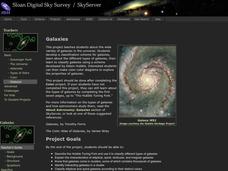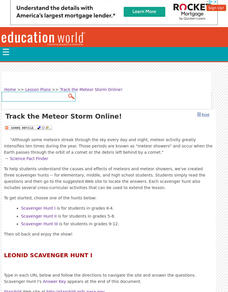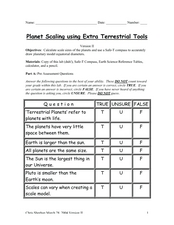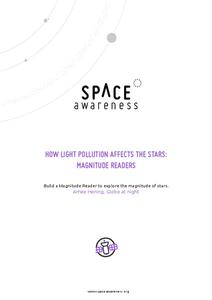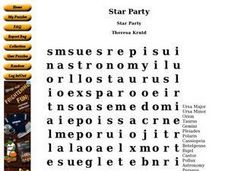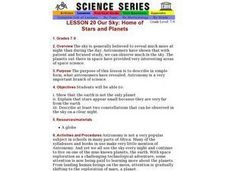Curated OER
Follow the Sun
Students use a simple model of the Earth and Sun as seen from space to explore the sun's apparent movement across the sky over the course of a day and year. They consider the apparent direction of movement and changes in the sun's angle.
Curated OER
Your Galactic Address
Students discover their place in the universe. In this astronomy lesson, students identify their location on various maps that have increasingly larger scales. In the end, the students write their address in terms of their location in...
Curated OER
Galaxies
Students use the provided website to classify galaxies after exploring information about elliptical, spiral, lenticular, and irregular galaxies and using the Hubble Tuning Fork.
Curated OER
Star Child Astronomy
Students gain understanding of the relationship of Earth within the Solar System. They increase knowlegde of the planets, sun, moon, meteoroids, asteroids and comets.
Curated OER
Track the Meteor Storm Online!: Leonid Meteor Showers, Astronomy
Young scholars are guided through an online series of readings and questions to explore the Leonid Meteor Showers and related topics. Modifications are provided for teaching this instructional activity to k-4, 5-8, and 9-12 students.
Curated OER
An Alphabet Journey Through Space
Third graders author a book about the universe to be shared with a younger audience. After compiling an alphabetic list of words related to the universe, 3rd graders research a definition for each word and put them in book form. Books...
Curated OER
The Drake Equation
Students use the Drake Equation to calculate the probability of sustaining life on various planets. Through the use of the equation, they determine whether intelligent and advanced civilizations can be developed on planets other than...
New York Science Teacher
Planet Scaling using Extra Terrestrial Tools
Your class will use a set scale to convert diameters of planets to the model size, the diagram given to expand on the number of planets drawn as concentric circles, and examine the scale that would be needed to fit the larger planets on...
Curated OER
Starlight, Star Heat
In this stars worksheet, learners read how astronomers calculate the temperature of a star by measuring its color. Students use a chart showing star temperatures and colors to complete 3 short answer questions.
Space Awareness
How Light Pollution Affects the Stars: Magnitude Readers
Did you know light can decrease visibility? Light pollution absolutely makes it more difficult to see stars. Scholars build a simple magnitude reader to determine the magnitude of stars. They use these data to estimate the impact of...
American Museum of Natural History
Meet the Universe's Main Attraction ... Gravity
Learners read a short description about gravity and what it does and then explore the two ideas about how gravity works. After gaining a better understanding of the concept, individuals participate in a thorough experiment on what would...
Curated OER
Scale Model of the Solar System
Students explore the size of the planets. In this science instructional activity, students create a scale model of the solar system. Students determine a scaling factor and calculate the size of their planets. Students create a scale...
Curated OER
Asteroids
Students examine the different types of asteroids and how they enter the atmosphere. In this space lesson students use mashed potatoes to create an asteroid they can eat.
American Museum of Natural History
Field Trip Mars
Fly around the Martian surface. Pupils view a presentation on the planet Mars featuring a flyover that shows different views of the surface where rovers have landed and explored on different missions. As individuals watch the images, the...
Curated OER
The Celestial Sphere and Circumpolar Motion
Students investigate the celestial sphere and circumpolar motion. In this science lesson, students view an applet, The Celestial Sphere and Circumpolar Motion. Students discuss the Earth's rotation and stellar movement.
Curated OER
Tides
Young scholars discover how the position of the Sun, Moon and Earth affect tides. In this science lesson, students view a presentation about the tides. Young scholars discuss the different types of tides.
Curated OER
Your Weight on Other Planets
Students explore their weight on other planets. For this science lesson, students view a presentation about the other planets and complete a worksheet in which they make predictions about their weight on the moon and other planets.
Curated OER
Star Party
In this space worksheet, students identify and locate vocabulary terms related to the stars and space. There are 15 words located in the puzzle.
Curated OER
Why Do We Have Night?
Learners engage in a fun, creative way to discover how the Earth moves. This lesson helps students explain why there is day and night. It can also create curiosity to further study the solar system and eclipses!
Curated OER
Galaxies
Tenth graders explore the structure and content of galaxies. Through discussion, lab, and hands-on activities, they discover the general structure of the three types of galaxies as well as the effect they have on the structure and...
Curated OER
Meteor Showers
Students use the Internet to discover the wonderful world of comets and meteor showers. They discover how to spot one and predict them using a calendar. They also examine the makeup of meteoroids and meteorites.
Curated OER
Starquest
Students study the history and cultural interpretation of a celestial body or constellation. They create technology based presentations of the information.
Curated OER
Solar Systems Models Foldable Question Sheet
For this solar system worksheet, students use foldable models they made of the planets to answer questions about each planet. They answer questions about the theories and predictions made in our history about the solar system and answer...
Curated OER
Our Sky: Home of Stars and Planets
Students discover that astronomy is a branch of science that includes the study of planets, stars, and constellations.




